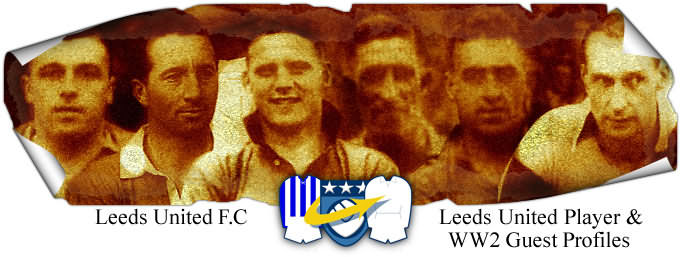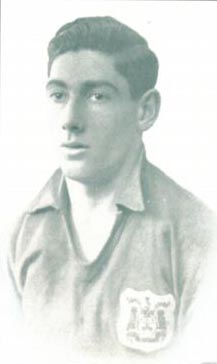

Browne: Robert James (Bobby)
1935-1947
(Player Details)
(Leeds United War-time Guest Player Details)
Wing Half
Born: Londonderry: 09-02-1912
Debut v Aston Villa (h): 26-10-1935
5’8” 10st 10lb (1935)
When he signed for Leeds, Browne was just 5’7” tall and weighed in at 9st 8lb, and was
described by them as a “little ’un”. He came to the notice of United when he was a member of
the Irish League team which made history by beating the English League, by 2-1, in front of
28,000 at Bloomfield Road, for the first time in the history of the game, when the English
XI contained such fine players as Frank Swift and Raich Carter. Browne was on Derry’s books
and Leeds wasted no time in signing him after the game. On 9th October 1935 the former Leeds
City, Sheffield United and Irish International star, Billy Gillespie, who had helped launch
Browne’s career as Manager of Derry City, arrived at Elland Road with the young Irishman and
Browne signed professional forms with Leeds for a transfer fee of £1,500. He had started by
playing part-time football in Ireland, while working as a joiner. He had begun with junior
clubs, Maleven and Clooney Rovers, before joining Derry City, where Gillespie was Manager.
While at Derry City, he earned a regular place in the side and the club won the 1934-35 City
Cup and also the North-Western Cup. There were some who asked whether such a young stripling
could stand up to League football. They asked similar questions when another little Irishman
arrived at Elland Road, by the name of David Cochrane, but in both cases they need not have
worried. He had already represented the Irish League against the Football League before
signing for Leeds. After his arrival, he didn't play the first two games for Leeds, on the
second he was making his International debut for Northern Ireland, and so his first game for
Leeds was on 26th October 1935, in a 4-2 home win against Aston Villa. He was capped six
times for Northern Ireland while with Leeds. He gained those caps on 19th October 1935 in a
1-3 defeat by England at Belfast, on 11th March 1936 in a 3-2 win over Wales at Belfast, on
23rd November 1937 in a 1-5 defeat by England in Belfast, on 16th March 1938 in a 1-0 victory
over Wales in Belfast, on 8th October 1938 in a 0-2 loss to Scotland in Belfast and his final
games was on 16th November 1938, alongside United team-mates Jim Twomey and Davie Cochrane,
in a 0-7 shallacking by England at Old Trafford, Manchester. It also proved to be Jim Twomey's
final game for Northern Ireland. He was, however, selected for the All British XI that drew
3-3 with the Football League XI at Goodison Park on 4th November 1939. Although he made seven
War-time appearances for United, they were split between three in 1939-40 and four in 1945-46
seasons. He had joined the Police at the outbreak of the war but resigned and became an Army
PT instructor at Aldershot. While there, he guested twice for Aldershot in 1939-40 and once in
1941-42, Tottenham Hotspur three times and Luton Town seven times in 1942-43, and Luton twice
more in 1943-44. In between he played for Derry City, when a war-time posting took him back to
Ulster, and he also guested for Watford, where he made twenty-two appearances in the 1944-45
and Swansea Town once, whilst stationed at Colchester. He was demobbed in November 1945 and
returned to Elland Road to play nineteen games in United’s disastrous 1946-47 campaign in
which they plummeted from the top flight. He left for York City in August 1947, where he
stayed until June 1948, making five League appearances. He was Player-Manager with Yorkshire
League club Thorne Colliery in 1949 and became coach of Halifax Town in August 1954. He had a
brief spell as Manager there, taking over from former Leeds team-mate Gerry Henry. He died in
1994.